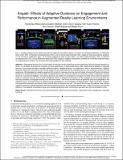Arigatō : effects of adaptive guidance on engagement and performances in augmented reality learning environments
Abstract
Experiential learning (ExL) is the process of learning through experience or more specifically “learning through reflection on doing”. In this paper, we propose a simulation of these experiences, in Augmented Reality (AR), addressing the problem of language learning. Such systems provide an excellent setting to support “adaptive guidance”, in a digital form, within a real environment. Adaptive guidance allows the instructions and learning content to be customised for the individual learner, thus creating a unique learning experience. We developed an adaptive guidance AR system for language learning, we call Arigato (Augmented Reality Instructional ¯ Guidance & Tailored Omniverse), which offers immediate assistance, resources specific to the learner's needs, manipulation of these resources, and relevant feedback. Considering guidance, we employ this prototype to investigate the effect of the amount of guidance (fixed vs. adaptive-amount) and the type of guidance (fixed vs. adaptive-associations) on the engagement and consequently the learning outcomes of language learning in an AR environment. The results for the amount of guidance show that compared to the adaptive-amount, the fixed-amount of guidance group scored better in the immediate and delayed (after 7 days) recall tests. However, this group also invested a significantly higher mental effort to complete the task. The results for the type of guidance show that the adaptive-associations group outperforms the fixed-associations group in the immediate, delayed (after 7 days) recall tests, and learning efficiency. The adaptive-associations group also showed significantly lower mental effort and spent less time to complete the task.
Citation
Weerasinghe , A M , Quigley , A J , Copic Pucihar , K , Toniolo , A , Miguel , A R & Kljun , M 2022 , ' Arigatō : effects of adaptive guidance on engagement and performances in augmented reality learning environments ' , IEEE Transactions on Visualization and Computer Graphics , vol. 28 , no. 11 , pp. 3737 - 3747 . https://doi.org/10.1109/tvcg.2022.3203088
Publication
IEEE Transactions on Visualization and Computer Graphics
Status
Peer reviewed
ISSN
1077-2626Type
Journal article
Description
Funding information: This research was supported by European Commission through the InnoRenew CoE project (Grant Agreement 739574) under the Horizon2020 Widespread-Teaming program and the Republic of Slovenia (investment funding of the Republic of Slovenia and the European Union of the European Regional Development Fund). We also acknowledge support from the Slovenian research agency ARRS (program no. BI-DE/20-21-002, P1-0383, J1-9186, J1-1715, J5-1796, and J1-1692).Collections
Items in the St Andrews Research Repository are protected by copyright, with all rights reserved, unless otherwise indicated.

